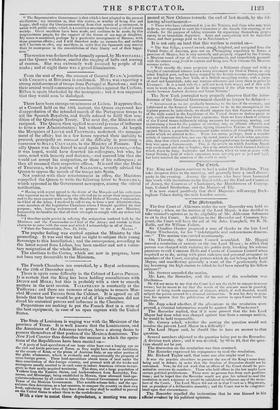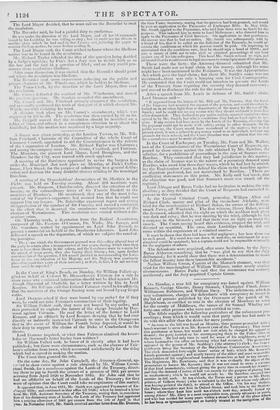Che Ifictropaitl.
The first Court of Aldermen tinder the new Mayoralty was held on Tuesday ; when, on the motion of the Lord Mayor, it was decided to take counsel's opinion as to the eligibility of Mr. Alderman Salomons to sit in that Court. In addition to the Recorder arid Common Ser- geant, the Court will have the aid of Sir John Campbell, Sir R. N. Rolfe, and Sir William Follett.
Sir Claudius Hunter proposed a vote of thanks to the late Lord Mayor Winchester, for his " indefatigable zeal and courteous demean- our." This motion was carried unanimously.
On Thursday, the Common Council assembled. Mr. Heppel moved a resolution of censure on the late Lord Mayor ; in which that person was charged with violating his public duty, breaking his solemn promises to call Common Halls and Courts of Common Council when required so to do, acting with great rudeness and personal arrogance to members of the Court, usurping powers which do not belong to the Lord Mayor, and manifesting generally a want of the " gentlemanly feel- ing becoming the high station to which he had been raised by his fellow citizens!"
Mr. Stevens seconded the motion.
Mr. Law, the Recorder, said the matter of the resolution was libellous— He did not mean to say that the Court had not the right to censure in severe terms; but he meant to say that the words of the cemaire must he guarded, instead of being words expressive of charges, which, if well. founded, would subject the person accused to a criminal information. It was his duty to men- tion his opinion that the puldicatiou of the matter in open Court would be libellous.
Mr. Jupp asked whether, if the allegations in the resolution were proved, a criminal information would lie against Mr. Winchester?
The Recorder replied, that if it were proved that the late Lord Mayor bad done what was charged against him from a corrupt motive, he would be held responsible. Mr. Corney asked, whether the putting the question would not involve the present Lord Mayor in a difficulty?
The Lord Mayor said, he should like to have an answer to that question.
Several members objected to the question being put to the Recorder. A division took place; and it was decided, by 89 to 43, that the ques- tion should not be put.
The discussion on the resolution was then resumed.
The Recorder expressed his repugnance to read the resolution.
Mr. Richard Taylor said, that some one else might read it— It was the practice elsewhere to prevent the use of the King's name from being used in debate, in order that the freedom of discussion should not be restrained. Now, he did not wish that an officer of the Court should be per- mitted to overawe its members. Those who held offices in the law might have certain political predilections. There were no persons free from such predilec- tions; and he hoped that the Recorder would not give his refusal to read the resolution in such a manner as would be calculated to influence any of the mem- bers of the Court. The Lord Mayor did not sit in that Court as a Magistrate, but as president of a deliberative assembly; and the Court was to be congratu- lated upon that circumstance.
The Recorder repelled the insinuation that he was biassed in his official coaduct by his political opinions.
The Lord Mayor decided, that he must call on the Recorder to read the resolution.
The Recorder said, be had a painful duty to perform—
He was under the direction of the Lord Mayor, and all law "al commands issued by his Lordship he was willing to obey ; but 1:e could nut use dict.ou in anotbei place which he had used in that Court; aud_believiug the paper to contain libellous matter, he must decline reading it.
The Lord Mayor said, the Court wished to know where the libelous matter was to be found in the resolution.
Mr. Richard Taylor ridiculed the idea of the question being decided by a Judge's opinion ; by Fox's Act a Jury was to decide both as to the law and the fact in a question of libel; and no Jury would pro- nounce these resolutions libellous.
After some discussion, it was carried that the Recorder should point out where the resolution was libellous.
The Recorder read some expressions reflecting on the public and private eharactur of Mr. Winchester, which he held to be libellous.
The Town-Clerk, by the direction of the Lord Mayor, then read the resolution.
Mr. Corney defended the conduct of Mr. Winchester, and moved the previous question. Mr. Senders seconded this umentiment.
Alta Feench and Mr. Pritchard strongly supported the resolution, and personally confirmed the truth of that part of it which charged Mr.
Wi ster with violating his word.
A division took place on Mr. Corney's amendment ; whic'a was negatived by !CO to ;30. The resolution was then carried by 99 to 35. Mr. Heppe!! moved that the resolution should be inscribed on a tablet of lerass, and affixed in a conspicuous situation in or about the Guildhall; but this motion was negatived by a large majority.



























 Previous page
Previous page